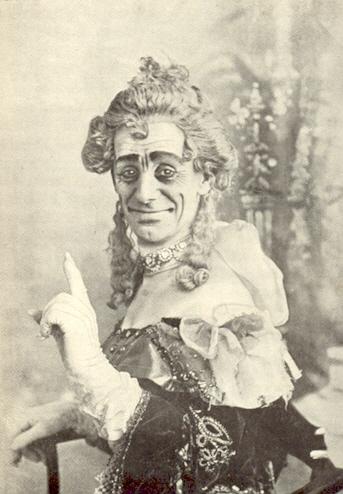
Edward Winter
(2006)

The above picture is of Dan Leno (1860-1904), a British music-hall performer and pantomime dame who was billed as ‘the funniest man on earth’.
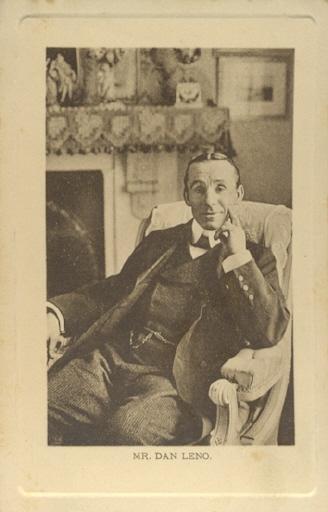
The following story, set in 1898, was published on pages 201-205 of Dan Leno by J. Hickory Wood (London, 1905):
‘It was at a café in Manchester while on this tour that Dan was challenged to play a game at chess. It came about in this way.
The smoke-room of this café was well provided with dominoes, chess- and draught-boards, and other playthings wherewith the busy Manchester man was wont to while away his dinner-hour.
Here Dan saw a spectacled youth of earnest and scholarly appearance, poring over a chess-board, and occasionally referring to a newspaper spread on the table by his side. From curiosity Dan paused and looked over his shoulder, as he had never before seen a man playing a game of chess with a newspaper as his only apparent opponent.
The youth looked up, and, seeing he was interested, naturally supposed that he knew something about the game.
“It’s a pretty opening, isn’t it?”, he remarked, handing the paper to Dan.
Dan accepted the paper; gravely examined the chess-board there portrayed, and agreed that it was as pretty an opening as he had ever met in all his experience. “And it’s very well drawn, too!”, he added as an afterthought.
“Oh, no!”, corrected the other. “It isn’t drawn at all. Can’t you see that White wins?”
“Of course”, replied Dan; “how stupid of me! Now I come to look at it again, I see that White wins. I suppose White is a very good man.”
“I beg your pardon!”, said the youth.
“Don’t apologize!”, returned Dan affably. “I don’t know the man personally.”
“Do you mean Zukertort?”, inquired the youth, looking rather puzzled. “It was Zukertort who played White.”
“I see!”, said Dan. “He played White, and lost.”
“No, no!”, contradicted the chess enthusiast, with growing impatience. “If you’ll look at the paper you’ll see that White won. It was Mason, who played Black, who lost.”
It was on the tip of Dan’s tongue to pursue the argument, and to point out to his new acquaintance that if Zukertort played White, and White won, then Zukertort must inevitably have lost; and also to inquire further what on earth that had to do with Mr Mason, who had apparently been beaten by Mr Black.
The whole thing, however, seemed to be so very complicated that he wisely desisted, and contented himself with gazing at the paper and murmuring “Exactly” in as sapient a manner as possible.
“Perhaps you have time for a game?”, suggested the youth.
“Oh, yes!”, admitted Dan cautiously, “I have time.”
“Would you like to play?”
“Yes, I would like to play chess very much indeed!”
“Come along then!” And before Dan had quite made up his mind as to whether he would go through with it or not the men were arranged on the board, and the youth was waiting for him to take the opposite seat.
So Dan, not wishing to spoil sport, obediently sat down, and wondered mildly what was going to happen next.
The youth opened the proceedings by pushing a pawn forward. That seemed fairly simple; so Dan, imitating him, also pushed a pawn forward.
The first player then advanced another pawn, and Dan, following suit, again did likewise.
Then the expert picked up one of his pieces (presumably a knight) and executed a manoeuvre with it that Dan afterwards described as being very like the zigzag flight of a snipe.
This was far beyond the powers or understanding of Leno the novice; so he, following the accepted custom as he had observed it among people who played chess, planted his elbows on the table, buried his head in his hands, and gazed steadily and raptly at the chessboard.
This species of passive resistance he prolonged so unduly that his opponent, growing impatient, felt himself constrained to remark, in a tentative manner, “Your move, I believe!”
“I know”, said Dan briefly, and without raising his head.
Another period of inaction ensued, during which the youth waxed mildly sarcastic. “I suppose you wouldn’t care to play with a time-limit, would you?”, he asked.
“Oh, no!”, replied Dan politely. “Don’t worry about me. I’ve plenty of time, thank you.”
With which remark he resumed his reverie, and maintained a masterly immobility that declined to be shaken by impatient coughs, shuffling of the feet, hints either mild or strong, or, in short, by any plan his antagonist could devise whereby to goad him into action.
At last the latter, being able to bear the strain no longer, looked at his watch, rose abruptly, and shortly remarked, in a very gruff tone of voice, “Good afternoon!”
“What! Must you go so soon?”, asked Dan, looking up in innocent surprise.
“Soon!”, echoed the other bitterly. “I’m ten minutes overdue at the warehouse now, and all through you!”
“Then it’s a drawn game”, announced Dan, rising from his seat with a sigh of relief.
“I should think you’ve played a good many drawn games in your time”, commented the youth sarcastically.
“No”, returned Dan, “this is the only one.”
“There’s one thing certain”, went on his disappointed adversary, buttoning his coat fiercely. “You’ll never be beaten! Life’s much too short for that.”
“Quite right!”, agreed Dan, with unruffled composure. “I’ve never lost a game of chess in my life.”
“I don’t believe it”, retorted the other explosively. “No man who could play chess at all would have sat for the best part of an hour worrying over a perfectly simple move such as that one was.”
“I daresay you’re right”, returned Dan. “But then, don’t you see, I can’t play chess at all.”
“You – can’t – play – chess?”, exclaimed the youth, now goaded to the fiercest indignation. “Then why on earth didn’t you say so at first?”
“I’m not quite sure”, was Dan’s reply, “but I think it must have been because it never occurred to you to ask me.”’
See also pages 97-98 of the January 1907 issue of Lasker’s Chess Magazine. We do not know the original source of the chess tale; it was not, for instance, in the volume Hys Booke.
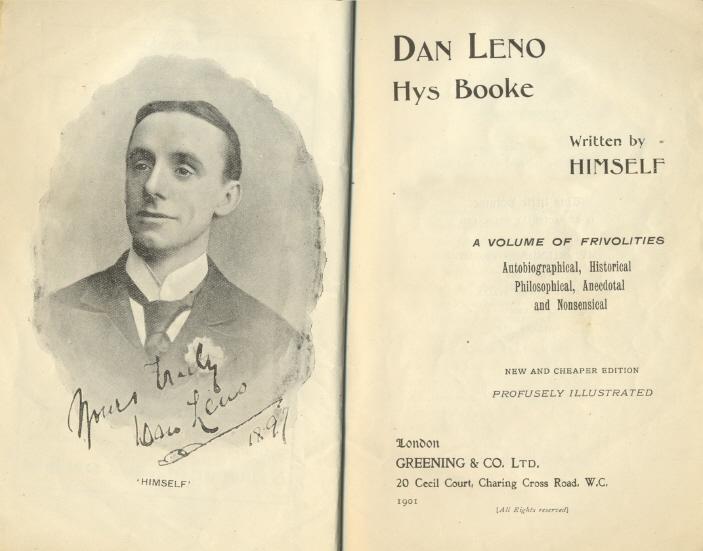
In any case, page 71 of The Funniest Man on Earth by Gyles Brandreth (London, 1977) stated that Hys Booke was ghosted by a young writer named T.C. Elder.
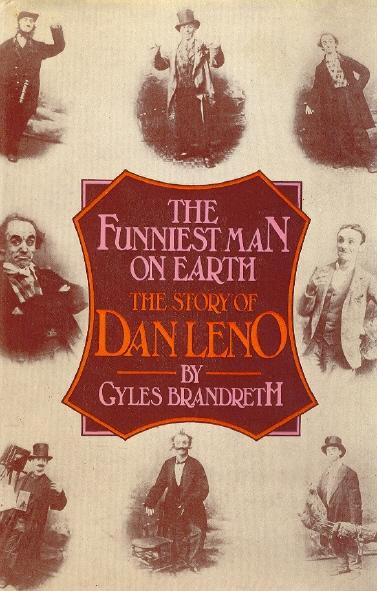
(4647)
Nineteen sketches (patter and song) performed by Dan Leno between November 1901 and April 1903 are commercially available on a CD from Windyridge.
(4702)
The start of the above-mentioned item as reproduced on pages 97-98 of the January 1907 issue of Lasker’s Chess Magazine, the source being specified as R.J. Buckley:
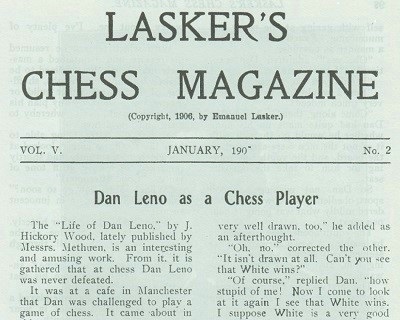
The sketch was also published on pages 105-106 of the January 1920 Chess Amateur.
To the Chess Notes main page.
To the Archives for other feature articles.
Copyright: Edward Winter. All rights reserved.